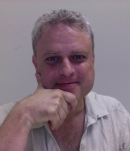Contact
Email:
Erik.Curiel@lrz.uni-muenchen.de
Website:
http://strangebeautiful.com/
Downloads
- CV, Curiel Erik (January 2021) (349 KByte)
Further Information
I earned my A.B. (honors) as a double major in physics and philosophy at Harvard University, under the supervision of Profs. Hilary Putnam, Robert Nozick and Sheldon Glashow. I earned my Ph.D. in philosophy from the University of Chicago, working with Profs. David Malament and Howard Stein in philosophy and Profs. Robert Geroch and Robert Wald in physics. During my time in Chicago, I took the full load of classes that a physics graduate student would take, and spent three years with an office working as a graduate student in the Relativity Group at the Enrico Fermi Institute of the University of Chicago's Physics Department. I have held teaching and research positions at Stanford University, the Center for Philosophy of Science at the University of Pittsburgh, the London School Of Economics, Trinity College (Cambridge University), and the Rotman Institute of Philosophy at the University Of Western Ontario. I am currently assistant professor at the MCMP and (since 2017) Senior Research Fellow at the Black Hole Initiative at Harvard (where I spend a couple of months every year). I visit the University of Florence for a couple of weeks every year as an Erasmus Fellow in the Dipartimento di Lettere e Filosofia. I was a Senior Research Fellow at the Smithsonian Astrophysical Observatory in the Radio and Geoastronomy Division between 2018 and 2020.
I think this is all pretty good for a kid originally hailing from Dallas, Georgia, a hamlet in the deep rural American South.
I was trained both as a philosopher and as a theoretical physicist because my interests include not only issues in each discipline separately but, even more, the overlap of the two. This comes not only from the philosophical side---so much of theoretical physics today is done in the absence of constraint by experimental data that it often resembles traditional philosophy, grappling with such issues as the nature of space and time, the character of physical quantities such as the entropy of a black hole, and even the appropriate scope and foundation of physical theory itself, being driven by conceptual analysis and Gedankenexperimente alone. My current work in these areas focuses on the intersection of general relativity, quantum field theory and thermodynamics, primarily in the physics of black holes, early-universe singularities, and related gravitational phenomena in the semi-classical regime. In general philosophy of science, I work primarily on the semantics of scientific theories and the structure of
our knowledge in science and its epistemology, where I grouse a lot about the inadequacies of the semantic view of theoriesand the field's morbid focus on ontology. I'm trying to work out my own accounts, with a great deal of sympathy for the pragmatism of Peirce and Carnap and Howard Stein. On the purely philosophical side, I spend some time working on the ancient Greeks, just because I love them, and on the history of 20th century analytic philosophy. On the purely physics side, I enjoy working on the mathematical foundations of classical mechanics and various problems in classical general relativity, especially constructing more astrophysically realistic models of the interiors of perturbed black holes. Really, though, I love to think and talk about almost anything---I fervently hold with Plato that all true philosophy happens in conversation. "Brotherhood of men comes not from community of thought but from consanguinity of mind."---Proust.
Research Interests
- Philosophy of Physics (with an emphasis on technical work): general relativity, quantum field-theory on curved spacetime, black hole thermodynamics, semi-classical gravity, classical analytical mechanics, non-relativistic quantum theory, classical thermodynamics and statistical mechanics, cosmology, quantum gravity
- Philosophy of Science: semantics of scientific theories, scientific knowledge, reasoning and methodology, confirmation, causation, individuality and identity of physical systems, ontology, realism/anti-realism
- Ancient Greek Philosophy: primarily Plato and Aristotle
- History of Physics: primarily the 17th, 19th and 20th centuries
- History of Analytic Philosophy: Frege, Russell, Moore, Wittgenstein, Ramsey, Carnap, Quine, Anscombe, Geach, Putnam
- American Pragmatism: Charles Sanders Peirce, William James
- Philosophical Logic: subjunctive conditionals, theories of meaning and reference
Selected Publications
Recent Publications
-
Curiel, Erik
(2020)
Framework confirmation by Newtonian abduction
In: Synthese (full text available) -
Curiel, Erik;
Finster, F.;
Isidro, J.
(2020)
Two-Dimensional Area and Matter Flux in the Theory of Causal Fermion Systems
In: International Journal of Modern Physics D, Vol. 29, No. 15 (full text available) -
Curiel, Erik;
Finster, F.;
Isidro, J.
(2020)
Summing over Spacetime Dimensions in Quantum Gravity
In: Symmetry, Vol. 12, No. 1: pp. 138 (full text available) -
Curiel, Erik
(2019)
Singularities in Reissner–Nordström black holes
In: Classical and Quantum Gravity, Vol. 37, No. 2 (full text available) -
Curiel, Erik
(2019)
Framework Confirmation by Newtonian Abduction
In: Synthese, Vol. 198: pp. 3813-3851 (full text available) -
Curiel, Erik
(2019)
Numerical evolution of shocks in the interior of Kerr black holes
In: Physical Review D, Vol. 99 (full text available)


